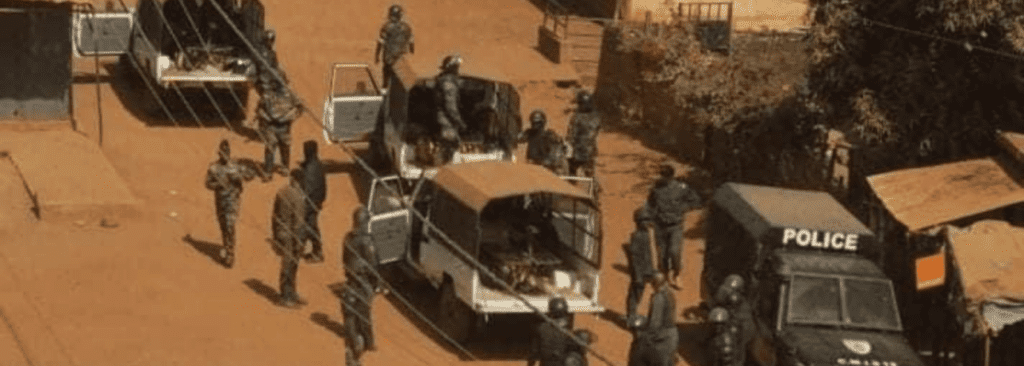As feared, Guinea’s 22 March constitutional referendum and parliamentary elections gave rise to further violence. At least 10 people were killed by police and armed forces, who again fired live ammunition at demonstrators; polling stations were ransacked and people trying to go to the polls were attacked. While the military played a central role in this double election, which was marred by serious irregularities, boycotted by the opposition and denounced in advance by regional and international bodies, our organisations call for the military to remain confined to their barracks and for judicial investigations to be systematically carried out in order to prosecute and punish the perpetrators of this violence.
The results of Sunday’s partially boycotted double election appear to be known in advance, seeming to pave the way for a new term for 82-year-old president Alpha Condé by lifting the constitutional ban on a third candidacy and offering him a parliament overwhelmingly committed to his cause. In closing off the political space, these elections will undoubtedly contribute to isolating the country on the international scene, while at the same time putting it at risk of a new cycle of serious political violence.
“The growing role played by the military forces throughout this election cycle makes us fear a return to the militarisation of Guinean political life and to the years of repression. We call on the Guinean government and the opposition forces to do everything possible to avoid further violence, to resume a constructive political dialogue, and to work in the interest of the Guinean people as a whole.”
Drissa Traoré, FIDH Secretary General.
Is the role played by the armed forces in these elections an indicator of the role that will be assigned to them in the coming months? After all army units were “put on alert” and deployed throughout the country starting 25 February in preparation for the elections (1), the military forces closely accompanied the 22 March elections. Not only were they widely present, but contrary to Article 80 et seq. of the electoral code, which requires that votes be counted at polling stations, several ballot boxes were taken either to town halls, prefectures or military garrisons to be counted.
The armed forces were also involved in the crackdown on demonstrators, whereas the security of the elections should have been the sole responsibility of the police forces and specialised units. Red berets, a unit notorious for its role during the 28 September 2009 massacres, are reported to have fired live ammunition at demonstrators, according to several witnesses.
In the eastern region of the country, particularly in N’Zérékoré, the ethnic and religious tensions were used by some to set people against each other. Clashes between communities, resulting in loss of life and destruction of places of worship (two churches and a mosque) were reported.
Civil society has also been targeted, and the work of some journalists impeded. The home of one of the leaders of the National Front for the Defence of the Constitution (FNDC), Mamadou Bailo Barry, was attacked on election day in Ratoma by a group of young activists from the ruling party, along with the police.
Finally, the headquarters of the Association of Victims, Relatives and Friends of 28 September: AVIPA, which has been fighting for 10 years with our organisations to ensure that the civilian and military leaders of the stadium massacre are finally brought to justice, was subjected to an intrusion attempt by agents of the special unit for securing the elections, who threatened and insulted association members.
“We denounce the attack on AVIPA’s headquarters on election day and call on the authorities to open an investigation to establish who was responsible and prosecute them. These attempts to intimidate Guinean civil society actors fighting against impunity are serious and unacceptable. We will continue to document the violence committed, to refer the matter to the judicial authorities, and to fight against the endemic impunity in our country.”
Abdoul Gadiry Diallo, President of the OGDH
Source link : https://www.fidh.org/en/region/Africa/guinea-conakry/guinea-achievements-of-the-democratic-transition-called-into-question
Author :
Publish date : 2020-03-24 07:00:00
Copyright for syndicated content belongs to the linked Source.
